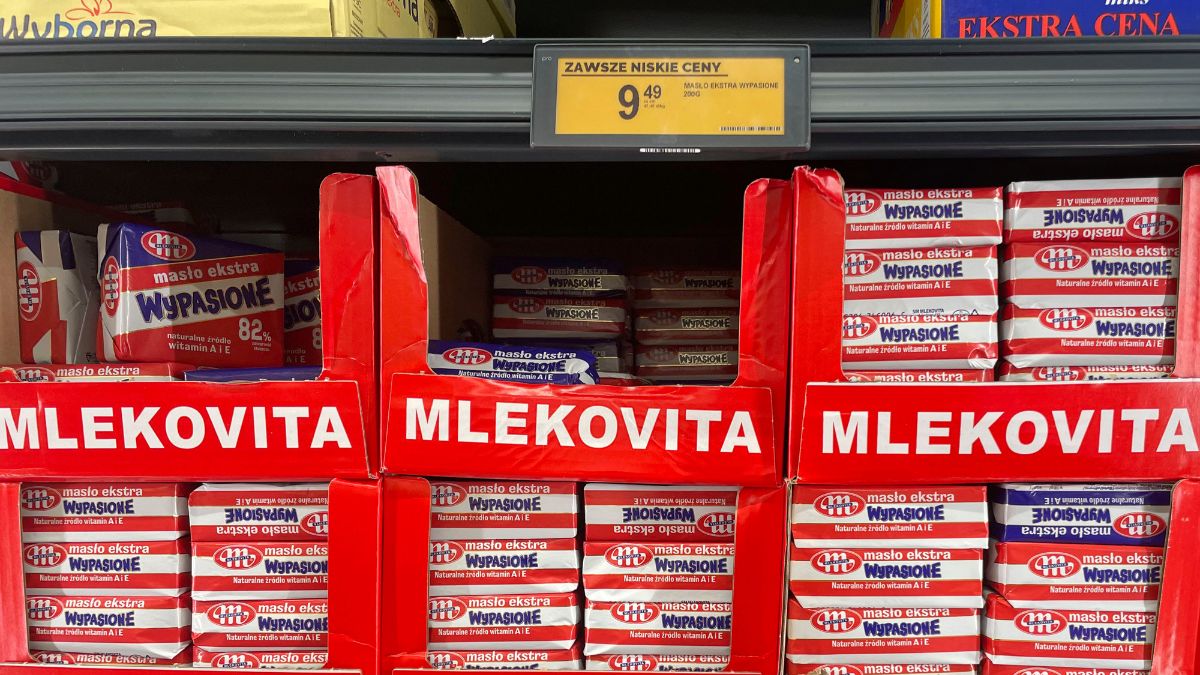In an effort to curb spiraling butter prices, Poland has announced the sale of up to 1,000 metric tonnes of its frozen butter reserves.
This measure, initiated by the Government Strategic Reserves Agency (RARS), aims to stabilise the market amidst inflationary pressures and heightened consumer demand, particularly during the pre-holiday season.
Why butter prices in Poland are surging
The price of butter in Poland has seen a sharp increase, with retail costs climbing by 20 per cent and wholesale prices surging by 50 per cent over the past year.
While inflation in the country stood at 3.9 per cent year-on-year in November, butter prices outpaced this figure significantly. These soaring costs have placed substantial strain on household budgets and made butter a symbol of the broader cost-of-living crisis.
The European Commission reports a 44 per cent rise in butter prices across the EU in 2024, driven by global dairy price surges.
This trend reflects worldwide pressures, with the United Nations’ Food and Agriculture Organisation noting a 20 per cent year-on-year increase in its Dairy Price Index. According to the UN body, global butter prices have reached record highs due to strong demand and tight inventories.
Compounding the issue, dairy processors have prioritised milk production for more profitable products like cheese, further squeezing butter supply. These dynamics have led to Poland’s strategic decision to intervene by releasing reserves.
How the government is tackling this
To address these challenges, RARS announced the auction of frozen, unsalted butter in 25-kilogram (55-pound) blocks at a minimum price of 28.38 zlotys ($7) per kilo. This price is significantly lower than current retail prices, which range from 39.90 to 49.95 zlotys ($9.84 to $12.32) per kilo in major supermarket chains like Biedronka. However, the final auction price could exceed the minimum.
“This emergency action… should contribute to stabilising butter prices in the market,” RARS stated, according to TVN24, a local commercial news channel. Polish Prime Minister Mateusz Morawiecki called it an “incidental win-win intervention,” highlighting that while butter in Poland remains among the cheapest in Europe, it is still unaffordable for many low-income families.
“The Government Strategic Reserves Agency won’t lose on this, as butter is very expensive,” Morawiecki added, noting the measure’s potential to deter price manipulation by speculators.
Butter enters political slugfest in Poland
Butter’s price surge has not only impacted consumers but also entered the political arena. Jarosław Kaczyński, leader of the right-wing opposition Law and Justice Party, mocked the cost increase by posting an image of butter stored in a safe, symbolising its newfound luxury status.
"Masło w sejfie" byłoby śmieszne, gdyby nie było straszne. Niestety, to ponury symbol tego rządu. Drożyzna, wysokie rachunki, ludzie zmuszani do lichwiarskich pożyczek - a rządzą dopiero rok. Wrócił Tusk, a z nim bieda. Czy wróci największa hańba III RP czyli głodne dzieci?… pic.twitter.com/0kkPp1763P
— Jarosław Kaczyński (@OficjalnyJK) December 9, 2024
Meanwhile, Rafał Trzaskowski, a prominent political figure, criticised the central bank’s handling of inflation and even joked about sending butter to the bank’s governor as evidence of mismanagement.
Economists like Rafał Benecki of ING Bank Śląski have weighed in, highlighting the broader economic context. “The current government is trying to intervene in advance of elections,” Benecki was quoted by CNN.
Despite inflation’s recent decline from a peak of 18.4 per cent in February 2023, surveys show persistent concerns about household spending. Benecki warned that wholesale butter price increases could signal even higher costs for consumers in the near future.
How this is affecting consumers in Poland
Recent data from market research firm NIQ indicates that Polish consumers are experiencing a mixed financial outlook. While spending on fast-moving consumer goods rose 4.3 per cent year-on-year in the third quarter, this growth reflects higher product prices rather than substantial volume increases.
Consumer sentiment remains cautious, influenced by ongoing inflationary pressures. The holiday season amplifies the significance of butter prices, as the ingredient is a staple in baking traditions.
The success of Poland’s intervention will depend on whether it can effectively stabilise the market without depleting reserves unnecessarily.
Butter as a barometer of economic strain
Poland’s decision to tap into its strategic butter reserves is part of a growing trend among governments worldwide. Strategic reserves, often associated with oil, gold, or foreign currency, are increasingly being used to stabilise food prices.
For instance, China has released pork from its reserves during shortages, and Canada has done the same with maple syrup .
The broader context of food inflation highlights the interconnectedness of global markets. Poland’s intervention serves as a case study in how nations can leverage reserves for economic strategy.
Also Read | Could Donald Trump’s deportation plan spike your grocery bill in the US?
With inputs from agencies


)

)
)
)
)
)
)
)
)



